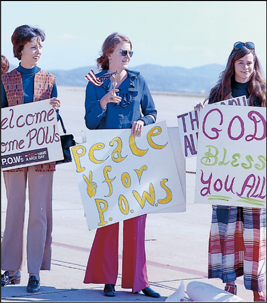
The Paris peace talks were a series of attempts to reach a negotiated settlement to the Vietnam War. The first attempt was initiated by the United States in 1968, shortly after the conclusion of the Tet Offensive. President Johnson announced on March 31, 1968, that the United States would stop bombing targets in North Vietnam and negotiate a peaceful settlement. The North Vietnamese government agreed, and representatives from both sides arranged to meet in Paris to discuss how to end the war in Vietnam. Thus began long, torturous, and often futile negotiations that would continue off and on until 1973.

Wives of marine POWs at Camp Pendleton, waiting for their freed husbands to emerge from the airplane that has brought them home.
There were many points of contention. The two most significant were that the North Vietnamese government refused to recognize the legitimacy of the South Vietnamese government and that the South Vietnamese government refused to agree to allow the Viet Cong a voice in the negotiations. At times it seemed that neither side was serious about ending the war.
After Richard Nixon became president in 1969, he added a second—and secret—chain of talks with Communists. This series of talks was led by National Security Advisor Dr. Henry Kissinger. Secret negotiations occurring simultaneously with public ones regarding peace treaties are not unusual. Sometimes there are subjects so sensitive that if any news of their discussion were made public, it would wreck negotiations. The Vietnam War had many complex and volatile issues that had to be resolved. The most important included the guarantee of South Vietnamese sovereignty, the withdrawal of all Communist troops from South Vietnam, and the repatriation of all American POWs. It was these secret discussions, together with the failure of North Vietnam’s Easter Offensive and the follow-up of the United States’s Linebacker I and II bombing raids that finally broke the deadlock in the negotiations.
On January 27, 1973, the “Agreement on Ending the War and Restoring Peace in Vietnam” was signed in Paris by the United States, North Vietnam, South Vietnam, and the Viet Cong. The key clause was that all U.S. troops would leave South Vietnam within sixty days simultaneously with the return of all American POWs.
But before the ink was even dry on the treaty documents, both North and South Vietnam were violating the cease-fire truce. The only clause honored was the departure of all American troops and the eventual release of American POWs. Fighting would continue in Vietnam for two more years.